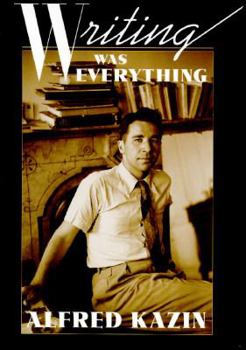Writing Was Everything
(Part of the The William E. Massey Sr. Lectures in American Studies Series)
Select Format
Select Condition 
Book Overview
For more than sixty years Alfred Kazin has been one of the most eloquent witnesses to the literary life of the mind in America. Writing Was Everything is a summation of that life, a story of coming of age as a writer and critic that is also a vibrant cultural drama teeming with such characters as Hart Crane and Allen Ginsburg, Simone Weil and Flannery O'Connor, Hannah Arendt and Robert Lowell, Edmund Wilson and George Orwell.
Format:Hardcover
Language:English
ISBN:0674962370
ISBN13:9780674962378
Release Date:May 1998
Publisher:Harvard University Press
Length:152 Pages
Weight:0.65 lbs.
Dimensions:0.7" x 5.3" x 7.7"
Customer Reviews
3 ratings
Simply Brilliant
Published by Thriftbooks.com User , 19 years ago
The world lost a truly remarkable man of letters when Alfred Kazin died in 1998. Fortunately he left behind a trail of criticism, essays and memoir that allow us to enjoy him ad infinitum. WRITING WAS EVERYTHING is the text of lectures he delivered at Harvard in 1994, an amalgam of criticism, history and personal anecdote that celebrates the massive energy in literature and intellectual discourse that took place in the 1930s, the war years and its aftermath. Born in 1915 to Jewish immigrants and raised in the Brownsville section of Brooklyn, Kazin experienced the world and gained a ticket to it through reading. Using his own passion as a guide, Kazin tours the major American and European writers' experience and the ways in which they interpreted the 20th century cultural and historical earthquakes. It was a time when writing was living and readers were affected by what they read. It was a time when people beyond the academy talked about philosophy, when it was still connected to daily life. It was a time when people debated religion, not the political machinations or social prescriptions of a few denominations but the questions of pursuing faith in the face of war, genocide and cultural upheaval. It was a time when people took seriously the need to find a social and political order that could right wrongs. Kazin's voice is most fluent and vivid. It is full of wonder and awe. It is obvious that he is not thrilled with the hegemony of lit crit or the dispassion with which contemporary academics treat texts, but he does not waste time attacking the current mode; rather he foils it with remarkable stories and assessments of Orwell, Joyce, Elliott, O'Connor, Weill, etc., etc.
A Treasure; The Best Intro to Kazin
Published by Thriftbooks.com User , 24 years ago
I can only add my voice to the words of the previous reviewer; I think this wonderful book endears itself immediately to most readers simply by being so humble. Kazin mourns the current state of literary academia, in which it seems that criticism can exist only as a political philosophy or as an elitist game of celebrity-making. Rather, Kazin aspires to (and fondly remembers) literary criticism as a effort of love by one writer for another. As he says in this book, "what brings us closer to a work of art is not instruction, but another work of art."If you love books, and especially if you dislike the elitism of the academic establishment, you will love Kazin. "Writing Was Everything" is also a great introduction to Kazin. It is very slim--I read it in one sitting--and is very readable, as it is as much autobiography as academic cri de coeur. Even this short work is peppered with pithy insights, and is helpful in understanding a number of the important novelists and poets of our time. "Writing Was Everything" is well worth the few hours it takes to read, and will likely be your invitation to reading others of Kazin's works.
A Reader's Critic
Published by Thriftbooks.com User , 25 years ago
Alfred Kazin's death last year robbed America of a rare character in the world of arts and letters: a humble critic. WRITING WAS EVERYTHING offers the reader a glimpse of that wonderful mind that spoke to the reader, not to the theorist. Kazin mourned the days when litersture "was held sacred". This delightful little book is the perfect summation of a near perfect observer of American writing.





